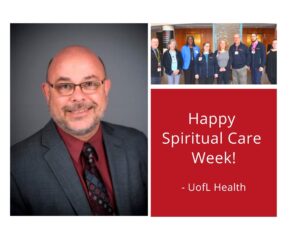
*Not pictured: Kirt Hodges
The week of Oct. 25 marks the 35-year anniversary of Spiritual Care Week, a time dedicated to celebrating chaplains and pastoral counselors who play a significant role in the healing, coping and recovery process for both team members and patients.
In honor of Spiritual Care Week, we are shining the spotlight on Frank Woggon, director of Chaplaincy Services at UofL Health – UofL Hospital and Jewish Hospital and UofL Health’s Chaplaincy services.
Originally from Berlin, Germany, Frank has been a practicing chaplain for 30 years, with 14 of those years spent with UofL Health. Frank was ordained as a German Baptist minister and is endorsed by the Alliance of Baptists. He studied at the University of Hamburg and the German Baptist Theological Seminary and received his master’s in divinity and a doctorate of philosophy from Southern Baptist Theological Seminary.
“I’ve always liked the academic setting,” said Frank.
UofL Health chaplains work around the clock each week to ensure patients and staff receive spiritual and emotional support in stressful situations. They are assigned to specialty areas, such as the ICU, inpatient and outpatient oncology, palliative care and part-time in the psychiatry department. They are often the first to respond to families of trauma patients in the ER and Trauma Center, where they provide crisis care to the families or individuals dealing with a crisis or emotional stress. Chaplains also help patients and families to process medical information in a way that doesn’t overwhelm those dealing with a difficult or stressful situation.
Aside from his regular chaplain duties, Frank also teaches in the chaplain residency program at UofL Hospital, along with Les Small Stokes, the program manager. He teaches chaplain residents about the intersections of spirituality and health.
Frank was most excited about UofL Health becoming a system because of the possibilities of expanding the chaplaincy training program. Currently, chaplains are only available at UofL Hospital, Jewish Hospital, Brown Cancer Center, Peace Hospital and Mary & Elizabeth Hospital. One of Frank’s goals is to have chaplain services established in all UofL Health facilities as well as to grow the chaplaincy program within the facilities.
When asked about his team, Frank couldn’t comment enough on how proud he is of his group.
“I have a stellar team,” said Frank. “They are always living up to the challenges put in front of them. They are experienced spiritual caregivers that have been consistent throughout the COVID-19 pandemic.”
Due to COVID-19, several hospital systems withdrew or restricted chaplaincy programs, but UofL Health leadership thought differently. Leaders agreed Chaplaincy is an essential service at UofL Health, so the team increased services and put in more weekend hours for staff support.
“We have been conducting telehealth chaplaincy appointments so we can act as a bridge for those battling COVID-19 and other diseases to connect with their loved ones,” said Frank.
Frank is also excited about a new project to integrate the role of the Independent Living Donor Advocate at UofL Health – Jewish Hospital Trager Transplant Center with Chaplaincy Services. This role supports potential living donors and ensures that those waiting to donate organs, such as kidneys, understand the informed consent process and feel no emotional pressure or force to give their organs.
“Advocacy is a key part of our job description,” said Frank. “Part of our job is to ensure patients are being treated justly and fairly and are emotionally prepared for what is to come.”
It is important to note that UofL Health chaplains provide spiritual care to those that don’t claim a specific spiritual or religious organization as well as those who do affiliate with a specific group. Their main goal is to provide advocacy, resources and support to those who are experiencing a medical crisis or related stress.
“When you, someone in your family or maybe one of your patients is given a serious diagnosis or is challenged with a condition, it’s not only a physical event but also a spiritual event,” said Frank. “You start trying to make some sort of meaning out of the situation. We are here to give you the resources to begin making meaning out of the situation or at least to comfort those who just need someone to be present.”
Staff care is also a key role in chaplaincy services. If a staff member is experiencing an adverse or tragic situation, they or another team member can call a code to signal the chaplain on duty so that they can provide emotional support to that team member. The chaplain also does de-briefings with staff and follow-up services if requested by team leadership.
Other UofL Health Chaplaincy services include:
- Ritual services
- Community ministers
- Notary services
- Prayer requests
More information on UofL Health’s Chaplaincy Services can be found on MyULH or by clicking here.




